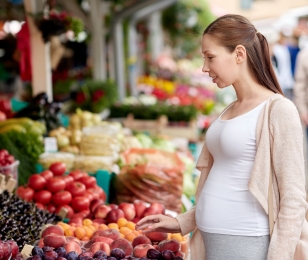14 November 2016
 Researchers at the University of South Australia are about to launch a new study to examine the impact of diet on the mental health of pregnant women and new mothers.
Researchers at the University of South Australia are about to launch a new study to examine the impact of diet on the mental health of pregnant women and new mothers.
Launched during National Perinatal Depression and Anxiety Week (November 13 -19), the study hopes to inform better approaches to managing mental health at what is a vulnerable time for many women.
UniSA lead researcher in population health and psychologist, Angie Willcocks says about 15-20 per cent of women will experience clinically significant levels of depression and/or anxiety from when they are about five months pregnant through to the first month after their child is born.
“This is the most vulnerable period because they are more likely to have mental health problems at this time than in any other period of their lives and the consequences can be pretty devastating,” Willcocks says.
“Mental health problems during the perinatal period can have an impact on obstetric and birth outcomes, on mothers’ relationships with their partners, how well they forge a relationship with their child and on the child’s social, emotional and cognitive development.
“There is a lot at stake on the personal level but beyond that, the costs associated with perinatal depression and or anxiety, are quite significant -in 2012 the estimate was about $78.66 million.”
Willcocks says over the years very little has changed in treatment options for women facing these problems.
Treatment is focussed on medications or psychological counselling, despite an increasing body of evidence showing the importance of lifestyle factors such as diet and exercise for mental health and well-being.
“Diet is especially significant for pregnant women because of the increased nutritional demands of pregnancy, but without the research to examine how diet may affect mothers’ mental health, dietary advice for pregnant women is usually directed only at the growing baby’s health,” she says.
“I’m launching an online study to look at diet quality and mental health for women during the perinatal period.
“This will be one of the first studies of its kind and I hope to discover more about the potential links between diet and depression during pregnancy to be able to offer women new evidence based information to help them to manage the mental health.
“I have tried to make this a really easy task for women by making the survey a completely online.
“The participants will need to fill in questionnaires at four points – twice during pregnancy and twice after the baby is born.
“What I hope to establish in the first instance is a much clearer understanding of what women are eating during the perinatal period and also how they are feeling in terms of mental health.
“In the first instance I’ll be looking for any patterns between diet and mental health problems and anxiety and then I hope to take the research further.”
Willcocks is hoping to attract more than 500 participants for the survey.
“Participants will be contributing to new knowledge in an area that is not well understood and hopefully, to better outcomes for many new mothers in the future,” she says.
Women can register to take part in the study by visiting www.perinatalfoodandmoodstudy.com.au .
Media contact: Michèle Nardelli mobile: +61 418 823 673 email: michele.nardelli@unisa.edu.au


